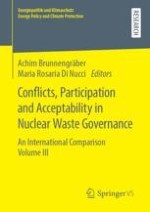This book is the last part of a trilogy and concludes a long-term project that focussed on nuclear waste governance in 24 countries. It deals with core themes of the disposal of high-level radioactive waste (HLW), e.g. the wicked problems of housing nuclear waste disposal facilities, public participation and public discourse, voluntarism and compensation in siting as well as the role of advisory bodies and commissions. The volume reflects on the diverse factors that shape the debate on what can be considered an ”acceptable solution” and on various strategies adopted in order to minimise conflicts and possibly increase acceptability. The various theoretical and empirical contributions shed light on several mechanisms and issues touched upon in these strategies, such as the role of trust, voluntarism, economic interests at stake, compensation, ethics, governance, and participation.
